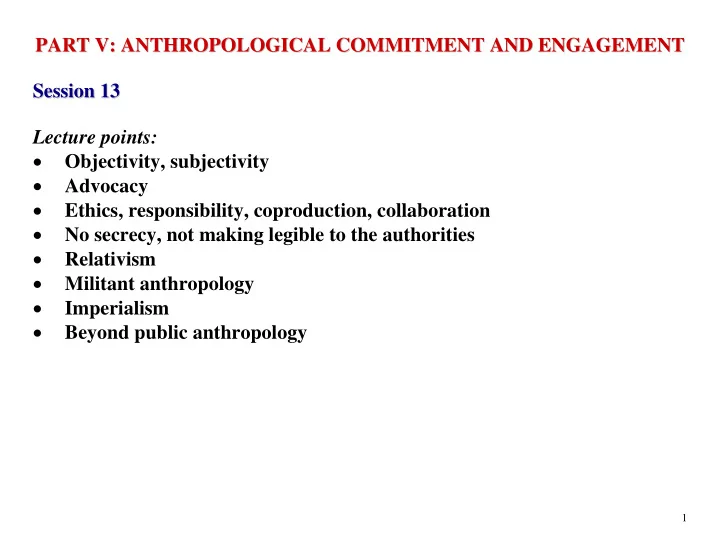

PA AR RT T V V: : A AN NT TH HR RO OP PO OL LO OG GI IC CA AL L C CO OM MM MI IT TM ME EN NT T A AN ND D E EN NG GA AG GE EM ME EN NT T P Se es ss si io on n 1 13 3 S Lecture points: • Objectivity, subjectivity • Advocacy • Ethics, responsibility, coproduction, collaboration • No secrecy, not making legible to the authorities • Relativism • Militant anthropology • Imperialism • Beyond public anthropology 1
Ch. 10. [Vincent reader] – Kathleen Gough, “New Proposals for Anthropologists,” 110-119. • How is anthropology a “child of western imperialism”? • Why has anthropology failed to analyze western imperialism? � “Anthropology is a child of Western imperialism. It has roots in the humanist visions of the Enlightenment, but as a university discipline and a modern science, it came into its own in the last decades of the nineteenth and the early twentieth centuries. This was the period in which the Western nations were making their final push to bring practically the whole pre-industrial non-Western world under their political and economic control” (p. 110) � “Until World War II most of our fieldwork was carried out in societies that had been conquered by our own governments. We tended to accept the imperialist framework as given, perhaps partly because we were influenced by the dominant ideas of our time, and partly because at that time there was little anyone could do to dismantle the empires. In spite of some belief in value-free social science, anthropologists in those days seem to have commonly played roles characteristic of white liberals, sometimes of white liberal reformers, in other spheres of our society…” (pp. 110-111) 2
� “…we have virtually failed to study Western imperialism as a social system, or even adequately to explore the effects of imperialism on the societies we studied….it is remarkable how few anthropologists have studied imperialism, especially its economic system” (p. 114) � “Why have anthropologists not studied world imperialism as a unitary phenomenon?....(1) the very process of specialization within anthropology and between anthropology and related disciplines….(2) the tradition of individual fieldwork in small-scale societies, which…placed constraints on our methods and theories; (3) our unwillingness to offend, by choosing controversial subjects, the governments that funded us; and (4) the bureaucratic, counter-revolutionary setting in which anthropologists have increasingly worked in their universities” (p. 115) 3
Gledhill, Ch. 9, “Anthropology and politics: commitment, responsibility and the academy,” 214-242. � “ ‘Advocacy is personal commitment for anthropologists, not an institutional imperative for anthropology’ ” (quoted on p. 214) � “…it is not clear that any academic knowledge can legitimately claim ‘objectivity’ and ‘detachment’ or that academics can avoid ‘taking a stance,’ even if they remain silent. What was problematic about colonial anthropology was precisely its silence, the reduction of questions of power to a neutral domain of ‘administration’….Today we must focus less on silence than on the greater dilemmas of speaking” (p. 215) � When writing and publishing, “we need to ask ourselves for whom this knowledge is produced” (p. 215) � “It is tempting to assume that anthropology’s ‘natural’ politics should be radical in the sense of being against Western domination, racism and oppression of the weak by the powerful. Yet many members of the profession hold relatively conservative personal views” (p. 217) 4
• What is the debate around anthropological involvement in political struggles? • What are the arguments against anthropological advocacy? Are any of these arguments rooted in a concern for the oppressed? • How has anthropological advocacy run against the politics of academia? • When it comes to conflicts around inequality, oppression, or imperialist domination: What can anthropologists do? What should they do? Why? 5
Recommend
More recommend